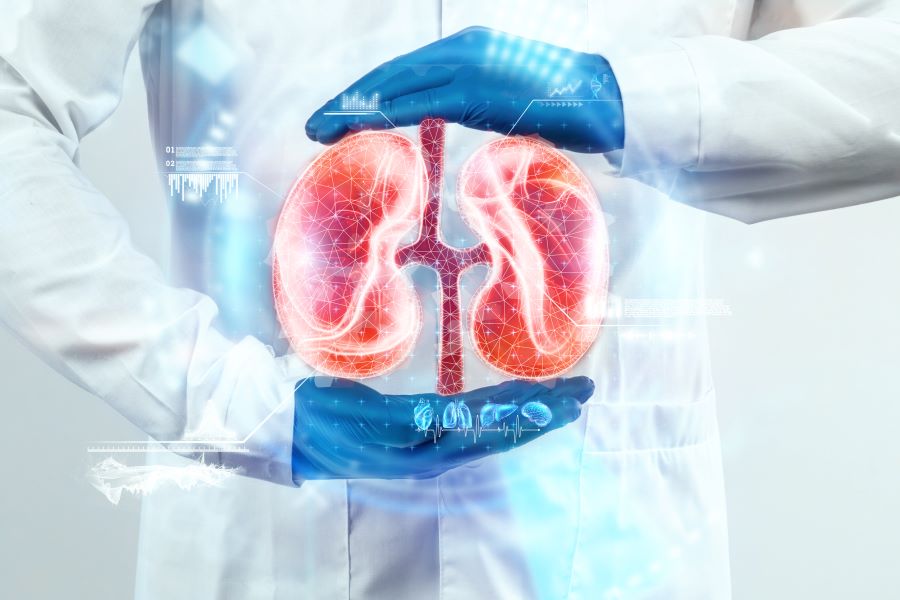Pyelonephritis, or kidney infection, is a painful condition. Escherichia coli (E. coli) causes this unpleasant illness. They are bacteria travelling from your bladder but end in one or both kidneys.
Cystitis is an infection of the bladder which is common. It makes urinating a painful experience. But a kidney infection is more severe than that. It will make you feel unwell. Prompt treatment will prevent your kidney infection from creating any harm. Failure to adhere to timely treatment can cause complications and kidney damage.
How do you get a kidney infection?
Several risk factors can increase the likelihood of developing a kidney infection, including:
- Being female: Females have shorter urethras closer to the anus, which makes it easy for the bacteria to enter the bladder,
- Urinary tract obstruction: Anything that obstructs or blocks the flow of urine can divert the bacteria too.
- Having a weakened immune system: People with weakened immune systems are more susceptible to infections,
- Using a catheter: Catheters can introduce bacteria into the urinary tract.
- Kidney stones: They can block urine flow and increase the risk of infection.
- Sexual activity: Sexual intimacy can also introduce bacteria in unwanted places.
- Pregnancy: The changes that happen in the urinary tract during pregnancy make it more likely to cause urine infections
Signs of a kidney infection
The following symptoms of a kidney infection often manifest within a few hours.
- pain in your abdomen, groin, or back -lower or side
- nausea or vomiting
- feeling that you have to pee often
- burning while urinating
- blood in your urine
- bad-smelling or cloudy urine
- chills
- Fever
Doctor’s top tip
Patients may not always be aware of their kidneys’ anatomical location. So, testing for renal angle tenderness will involve pressing firmly on your flank area just above the hips under your ribs. It could be one or both sides of your back.
The presence of tenderness or pain could indicate the presence of kidney stones or other kidney problems. The pain typically felt in the back could range from mild to severe but stones are usually very painful. Both renal stones and kidney infection causes one sided pain.
Can Kidney infection cause back pain?
When the kidneys in your back become infected, inflammation and swelling can occur. The condition will pressure the nerves, causing pain in the area.
What indicates kidney infection in urine tests?
Here are the steps involved in diagnosing a kidney infection:
- Medical history: Your doctor will ask you about your symptoms and health
- Physical exam: Your doctor will examine your abdomen and back, looking for signs of tenderness/ skin changes
- Urine tests: A urine sample will be collected and sent to a laboratory for analysis. The lab will check for bacteria, white blood cells, and other signs of infection. Top tip – take it with you. You can take it home or ask for a pot at reception.
- Watch my male UTI video on how to collect it properly-https://www.youtube.com/watch?v=x-cFpSb31TU&t=12s
Extra tests you might need include – a blood test – for infection, scans to look for abnormalities, urine culture – when we grow and check which bugs.
Later, you may need to refer to a specialist like a urologist or gynecologist for further investigations.
Kidney infection treatments + kidney infection medications
Most kidney infections need prompt treatment. Treatment involves antibiotics to prevent infection from damaging the kidneys or spreading to the bloodstream.
To prevent infection in the urinary tract, watch my other video for the top tips.
Best antibiotics for kidney infections
Your doctor’s prescription of antibiotics will be to treat bacteria specifically causing the infection. It depends on what’s available, the infection severity, and your health.
It is essential to take antibiotics exactly as prescribed. Finish the entire course of medication, even if you start feeling better. It is to prevent drug resistance.
Common antibiotics are ciprofloxacin, trimethoprim, penicillin-based abx,
Ceftriaxone – if needed, IV.
Kidney infection treatment
Antibiotics are the most effective way to eliminate the bacteria causing the infection. Hence, treating a kidney infection without antibiotics is not recommended as kidney infections are serious and potentially life threatening infections .
Untreated kidney infections can lead to severe complications, such as kidney damage or sepsis.
In severe cases of kidney infection, hospitalization may be necessary. In this case, you may receive intravenous fluids to help keep you hydrated and to deliver antibiotics directly into your bloodstream.
Kidney infection treatment- home remedies
Symptomatically, you can relieve and support your body’s natural healing processes:
- Drink plenty of fluids: Water and other fluids can help flush bacteria out of the urinary tract and prevent dehydration.
- Get plenty of rest: Resting can help your body recover and heal from the infection.
- Apply heat: Applying a warm compress to your back or abdomen can help relieve pain and discomfort.
- Use pain relievers: Over-the-counter pain relievers like acetaminophen can help relieve pain and reduce fever. Top tip – avoid anti-inflammatory painkillers (NSAIDs) such as ibuprofen – they may increase the risk of further kidney problems, so should not be taken unless advised by a doctor
Kidney infection when to go to hospital
If you have a kidney infection, it’s best to seek help urgently to prevent any complications.
Go to the hospital urgently if you have a fever, shivering, vomiting, blood in your urine, kidney pain, or a recent UTI and your symptoms have worsened.
Kidney infection recovery time
Most people diagnosed and treated promptly with antibiotics feel better after about two weeks.
People who are older or have underlying conditions may take longer to recover.
Kidney infection still hurts after antibiotics.
If you have a kidney infection and are on antibiotics, it can take a few days to start feeling better. However, getting urgent help is better if you’re in a worse state.
My top tip is
If you feel the antibiotics aren’t working, speaking to a doctor is better.
It is possible that the bacteria causing it is not sensitive to the antibiotics, or you have a different cause or another underlying condition.
The pain is also possibly related to inflammation and irritation in the kidney or surrounding tissue, which can take time to resolve even after the treatment.
Your doctor may recommend painkillers or other supportive measures to help manage your symptoms while your body recovers.
Are kidney infections contagious?
No, they are not. Bacteria found in the digestive tract can enter the urinary tract through the urethra. These bacteria can cause an infection in the bladder and then spread to the kidneys, leading to a kidney infection.
When kidney infection turns septic
If it does, it can lead to a severe and potentially life-threatening condition called sepsis.
Sepsis is a medical emergency when the body’s immune system overreacts to an infection and begins to attack its tissues and organs. If not treated promptly, it can lead to organ failure, septic shock, and even death.
Kidney infection vs UTI
A urinary tract infection (UTI) is an infection that affects any part of the urinary system. It includes the bladder, urethra, ureters, and kidneys. A kidney infection, or pyelonephritis, is a type of UTI that specifically affects the kidneys.
The symptoms of a UTI and a kidney infection can be similar. Still, a kidney infection is generally more severe. It usually causes additional symptoms, such as back pain, fever, chills, nausea, and vomiting.
How fast can a kidney infection kill you?
A kidney infection is a severe infection that can lead to serious complications if left untreated. While it is rare for a kidney infection to cause death, it can happen in extreme cases. Lack of timely treatment can lead to kidney failure or, if the infection spreads to other parts of the body or blood coudl lead to sepsis [life threatening condition where infections are in the blood].
But remember, this is rare, and with prompt early treatment, most people don’t get complications.
Conclusion
Kidney infection is serious, and it needs nothing less than prompt medical attention. Treatment options may include antibiotics, pain relievers, and IV fluids.
Remember, prevention is the best way to avoid a kidney infection, so take steps to maintain good urinary tract health.
Alternatively to see my video based on the above blog post please click on the following link
https://www.youtube.com/watch?v=6v_Z5co8igI
Disclaimer: The Content on this channel is for educational purposes and not intended to be a substitute for professional medical advice, diagnosis, or treatment. Always get advice from your Doctor if you are worried or have symptoms.
References:
https://www.nhs.uk/conditions/kidney-infection/
https://patient.info/kidney-urinary-tract/kidney-infection-pyelonephritis
https://bestpractice.bmj.com/topics/en-gb/3000111
https://www.nhsinform.scot/illnesses-and-conditions/kidneys-bladder-and-prostate/kidney-infection/#:~:text=A%20kidney%20infection%20(pyelonephritis)%20is,bladder%20that%20makes%20urinating%20painful.


